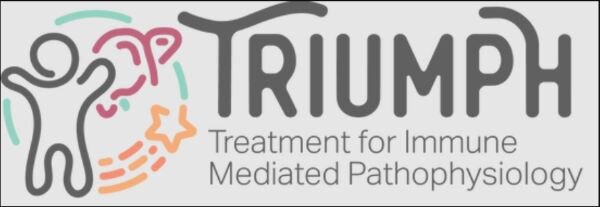Research Aims to “Triumph” Against Childhood Liver Disease
The impacts of liver disease can be devastating for children and their families. NIDDK and its partners support a wide range of research on liver diseases that affect children, with studies focusing on the early identification of disease resulting from multiple causes, preservation of liver function, and development of new treatment options. Much of this work is initiated by individual investigators supported by NIDDK, but the Institute also funds large networks of researchers focusing on specific types of liver disease in children.
Rare Liver and Biliary Diseases

Since 2008, NIDDK has sponsored studies through its Childhood Liver Disease Research Network (ChiLDReN). The Network’s goals are to facilitate the understanding of many rare biliary diseases in which the liver is damaged due to impaired bile flow in children, to discover new diagnostic and treatment options, and to help train the next generation of investigators specializing in pediatric liver diseases. ChiLDReN consists of sites across the United States and Canada, with additional support provided through partnerships with the Cystic Fibrosis Foundation and the Alpha-1 Foundation. The Network conducts studies on a variety of liver diseases affecting children, including Alagille syndrome, alpha-1-antitrypsin deficiency, biliary atresia, cystic fibrosis liver disease, progressive familial intrahepatic cholestasis, and others. Several important advances have come from the Network’s research, such as important insights into the genetics, pathogenesis, and treatment of biliary atresia and Alagille syndrome. For example, one Network study helped to provide the data necessary for the U.S. Food and Drug Administration to approve the first dedicated treatment for severe itching associated with Alagille syndrome in children.
Porphyrias are rare, often inherited diseases that can affect the liver and other organs from a young age. NIDDK has provided support for studies on porphyrias through the Porphyrias Consortium, part of NIH’s Rare Diseases Clinical Research Network. The Consortium is supported by NIDDK and NIH’s National Center for Advancing Translational Sciences. The Consortium’s studies aim to understand disease mechanisms and progression of multiple forms of porphyria and develop new approaches to diagnosis, treatment, and prevention, with children currently participating in some of these studies.
Nonalcoholic Fatty Liver Disease
In addition, NIDDK has supported pediatric research on the relatively common disease of nonalcoholic fatty liver disease (NAFLD)1 and its more severe form of nonalcoholic steatohepatitis (NASH)2. For example, the Nonalcoholic Steatohepatitis Clinical Research Network conducts clinical studies of nonalcoholic fatty liver disease in children. Recent studies by the Network have linked genetic risk factors to outcomes in children with NAFLD that can inform clinical care, and the Network has partnered with pharmaceutical companies and the Eunice Kennedy Shriver National Institute of Child Health and Human Development on clinical trials testing the safety and efficacy of new treatments for pediatric NAFLD.
Acute Liver Failure

Acute liver failure in children can result from damage due to viruses, metabolic disorders, drugs and toxins, or other causes. It is one of the most common reasons for children to need a liver transplant. The Institute has sponsored studies in children on severe liver injury caused by drugs, herbs, and dietary supplements through its Drug-Induced Liver Injury Network, which aims to develop better tools for diagnosis and prevention, and to enhance knowledge of disease processes. Recently, Network investigators found that antimicrobial and anti-epileptic drugs are leading causes of this form of liver injury in children, which can lead to acute liver failure requiring a liver transplant.
The newest of NIDDK’s pediatric liver disease research initiatives is also geared toward aiding children with acute liver failure. Launched in 2021, the Treatment for Immune Mediated Pathophysiology, or TRIUMPH study, is testing immunosuppressive therapy for children with acute liver failure of unknown cause. NIDDK has supported past studies on this topic through the Pediatric Acute Liver Failure Study Group, which paved the way for efforts such as TRIUMPH. The goal of the current study, which is currently enrolling participants at 20 sites across the country, is to test the safety and efficacy of two different treatments for improving survival of children with the rare and potentially life-threatening condition of acute liver failure for which no cause can be identified. Recent research supports the theory that many of these patients have liver injury related to heightened inflammation caused by an immune response to everyday infections or environmental exposures. Treatments to reduce inflammation may improve recovery in children with acute liver failure linked to immune disorders, increasing their chance of surviving and avoiding a liver transplant.
Liver Transplant
Related to this work, NIDDK supports the Improving Medication Adherence in Adolescents who Had a Liver Transplant Network (iMALT) study, which is testing an intervention in young people who have had a liver transplant due to multiple causes, including liver diseases and acute liver failure. The study involves monitoring of blood medication levels and remote communications from study staff, in order to boost adherence to taking the immunosuppressive medications needed to prevent rejection of the transplanted organ.
Through the collective efforts of these multi-center networks and investigator-initiated studies, NIDDK aims to help children and their families “triumph” over liver disease.
For additional information on the ChiLDReN and TRIUMPH studies see: childrennetwork.org/Clinical- Studies and www.pedsalf.com.
1Also referred to as metabolic dysfunction-associated steatotic liver disease or MASLD
2Also referred to as metabolic dysfunction-associated steatohepatitis or MASH

